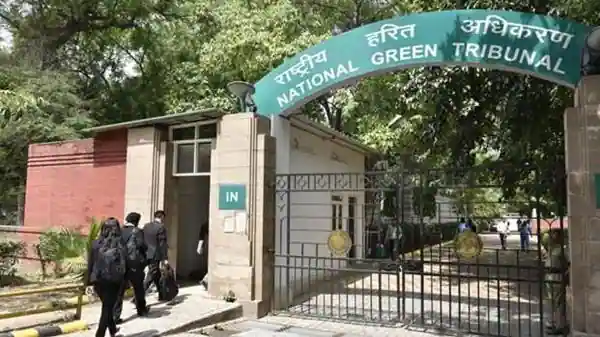In a landmark judgment that comes as a shot in the arm for legitimate environmental causes, the Supreme Court said the National Green Tribunal does have suo moto powers and can take up environmental issues on its own. The order came even as the Union government said NGT does not have such powers.
“The National Green Tribunal cannot afford to remain a mute spectator when no one knocks on its door,” the court said on Thursday while passing an order that vests suo moto powers to the body created under the National Green Tribunal Act 2010 for protection of the environment.
Holding that any other interpretation would go against the public good and render the environmental watchdog “toothless” and “ineffective”, a three-judge bench of Justices AM Khanwilkar, Hrishikesh Roy, and CT Ravikumar said, “It is vital for the wellbeing of the nation and its people, to have a flexible mechanism to address all issues pertaining to environmental damage and resultant climate change so that we can leave behind a better environmental legacy for our children and the generations thereafter.”
The court was considering a batch of appeals on the question of whether NGT has the power to take notice of press reports or even seek a response from the government (or government bodies) on preventing and protecting damage to the environment without any application being filed before it. The issue was raised by the Municipal Corporation of Greater Mumbai (MCGM) which was slapped with a fine of ₹5 crores by NGT for not setting up sewage treatment plants. The NGT order of October 2018 came on the basis of a news report. Subsequently, a similar exercise of suo moto power by NGT was challenged by the Kerala government in a case relating to the shifting of stone quarries from residential areas.
The bench declared, “It is accordingly declared that the NGT is vested with suo moto power in the discharge of its functions under the NGT Act.” Adding a rider, the bench added, “The exercise of suo moto jurisdiction does not mean eschewing principles of natural justice and fair play. In other words, the party likely to be affected should be afforded due opportunity to present their side, before suffering adverse orders.”
In its 77-page judgment, the Court said that given the fallout of the climate crisis, “where the adverse environmental impact may be egregious, but the community affected is unable to effectively get the machinery into action, a forum created specifically to address such concerns should surely be expected to move with expediency, and of its own accord.”
The NGT Act provided a specialized role to the tribunal to act on issues where a dispute arose under seven specified laws: The Water Act, The Water Cess Act, The Forest Conservation Act, Air Act, Environment Protection Act, Public Liability Insurance Act, and the Biological Diversity Act.
The issue before the court was whether an application by a person, as stated in Section 18 of the Act, alone can trigger action by the Tribunal. The Centre represented by the Additional Solicitor General (ASG) took the view that NGT can act on a letter or representation but cannot assume suo moto powers to act independently on any issue. This view was also supported by the court-appointed amicus curiae senior advocate Anand Grover.
Justice Hrishikesh Roy, writing the judgment for the bench, said, “The functional capacity of the NGT was intended to leverage wide powers to do full justice in its environmental mandate.” There were also concerns expressed by lawyers that suo moto powers could be abused. To counter this, the bench said, “As long as the sphere of action is not breached, the NGT’s powers must be understood to be of the widest amplitude.”
The court said it was conscious of the fact that often citizens may not approach the tribunal. This could be on account of illiteracy, lack of mobility, technical knowledge, or when powerful entities with adequate wherewithal skirt regulations. The bench said, “The duty to safeguard Article 21 rights cannot stand on a narrow compass of interpretation…. It may not always be feasible for individuals to knock on the doors of the Tribunal, and NGT in such exigencies must not be made dysfunctional. Procedural provisions must be allowed to fall in step with the substantive rights that are invoked in the environmental domain, in the larger public interest.” Article 21 of the constitution protects the right to life and personal liberty.
Further, the bench noted that addressing evolving environmental concerns will require a flexible institutional mechanism. “An affirmative role, beyond mere adjudication at the instance of the applicant, is certainly required for serving the ends of environmental justice, as the statute itself requires of the NGT.”.
“The hands-off mode for the NGT, when faced with exigencies requiring an immediate and effective response, would debilitate the forum from discharging its responsibility and this must be ruled out in the interest of justice… We cannot validate an argument which furthers uncertainty to justify the role of a spectator, if not in action, and would most assuredly result in injustice,” the court said.
Senior advocate Raj Panjwani, a leading lawyer on environmental issues said, “The judgment by the top court will strengthen the functioning of the NGT as there was always a lurking doubt over its power to take up suo moto cases. Since this tribunal was created under a statute, every attempt was made to restrict the Tribunal’s suo moto powers. This decision clears those doubts and paves way for NGT to be assertive on serious environmental issues that may necessarily not be agitated by any private individual.”






